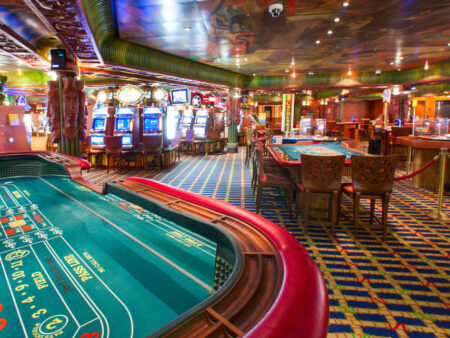
Introduction
Casinos have a rich and fascinating history, evolving from humble beginnings to becoming a multi-billion-dollar global industry. They offer a variety of games and entertainment options, attracting millions of visitors each year. This guide provides a detailed overview of casinos, including their history, types, popular destinations, economic impact, regulation, technological advancements, and future trends.
Historical Overview of Casinos
Early Beginnings
The concept of gambling has been around for centuries, with evidence of dice games dating back to ancient China and Rome. The first known gambling house, the Ridotto, opened in Venice in 1638. It was established to provide controlled gambling during the annual carnival season.
Evolution Through the Ages
Throughout the 18th and 19th centuries, gambling houses began to appear in various European cities. In America, the first casinos appeared on riverboats along the Mississippi River, providing entertainment for travelers. The 20th century saw the rise of Las Vegas as a gambling mecca, with the establishment of iconic casinos like the Flamingo and the Sands.
Modern Era of Casinos
Today, casinos are sophisticated entertainment complexes offering a wide range of gaming options, luxury accommodations, fine dining, and live entertainment. The advent of online casinos in the late 1990s revolutionized the industry, making gambling accessible to a global audience.
Types of Casinos
Land-Based Casinos
These are traditional casinos located in buildings or complexes. They offer a wide range of games, including table games, slot machines, and poker rooms. Land-based casinos are often part of larger resorts that include hotels, restaurants, and entertainment venues.
Online Casinos
Online casinos allow players to gamble over the internet. They offer the same variety of games as land-based casinos, with the added convenience of being accessible from anywhere. Online casinos often provide bonuses and promotions to attract players.
Cruise Ship Casinos
Many cruise ships feature onboard casinos, providing entertainment for passengers while at sea. These casinos typically offer a variety of games, similar to those found in land-based casinos.
Popular Casino Destinations
Las Vegas
Known as the “Entertainment Capital of the World,” Las Vegas is famous for its vibrant casino scene. The Las Vegas Strip is home to some of the most renowned casinos, including the Bellagio, MGM Grand, and Caesars Palace.
Macau
Macau is the gambling hub of Asia, with revenue surpassing that of Las Vegas. It is known for its luxurious casinos like The Venetian Macau and Wynn Macau, attracting high rollers from around the world.
Monte Carlo
Monte Carlo in Monaco is synonymous with elegance and luxury. The Casino de Monte-Carlo is one of the most famous casinos in the world, known for its opulent architecture and glamorous clientele.
Atlantic City
Located in New Jersey, Atlantic City is known for its boardwalk and casinos. It became a popular gambling destination after the legalization of casino gambling in the 1970s.
Casino Games
Table Games
Table games are a staple of any casino and include games such as Blackjack, Roulette, Baccarat, and Craps. These games are typically played against the house and involve a combination of skill and luck.
Slot Machines
Slot machines are the most popular casino game. They are easy to play and offer the chance for big payouts. Modern slot machines come with various themes and features, including progressive jackpots.
Poker
Poker is a popular card game played against other players rather than the house. Casinos often host poker rooms and tournaments, with Texas Hold’em being the most popular variant.
Specialty Games
Specialty games include a variety of other gambling activities such as Bingo, Keno, and scratch cards. These games offer different forms of entertainment and the chance to win prizes.
Economic Impact of Casinos
Job Creation
Casinos are significant employers, providing jobs in various sectors such as gaming, hospitality, and entertainment. They offer a range of positions, from dealers and servers to security and management.
Tourism Boost
Casinos attract tourists, boosting local economies. Cities like Las Vegas and Macau thrive on tourism, with visitors spending money on accommodations, dining, and entertainment.
Tax Revenue
Casinos generate substantial tax revenue for governments. These funds are often used to support public services and infrastructure projects, benefiting the broader community.
Regulation and Licensing
Importance of Regulation
Regulation ensures that casinos operate fairly and transparently. It protects players from fraudulent activities and ensures that casinos adhere to strict standards.
Licensing Bodies
Licensing bodies such as the Nevada Gaming Commission, the Malta Gaming Authority, and the United Kingdom Gambling Commission oversee the operation of casinos. They enforce regulations and issue licenses to compliant operators.
Responsible Gambling Measures
Casinos implement responsible gambling measures to help prevent addiction. These measures include self-exclusion programs, deposit limits, and access to support services for problem gamblers.
Technological Advancements in Casinos
Online Gaming
The rise of the internet has transformed the gambling industry. Online casinos offer convenience and accessibility, allowing players to gamble from their homes. They provide a wide range of games and often offer bonuses and promotions.
Mobile Gaming
Mobile technology has further revolutionized gambling. Players can now access casino games on their smartphones and tablets, enjoying a seamless gaming experience on the go.
Virtual Reality Casinos
Virtual reality (VR) technology is the latest innovation in the gambling industry. VR casinos offer an immersive gaming experience, allowing players to interact with their environment and other players in a virtual world.
Social and Cultural Impact of Casinos
Community Engagement
Casinos often engage with their local communities, supporting charitable initiatives and sponsoring local events. They contribute to community development and cultural activities.
Cultural Representations
Casinos are frequently depicted in popular culture, including movies, television shows, and literature. They are often portrayed as glamorous and exciting, contributing to their allure.
Social Challenges
While casinos provide entertainment and economic benefits, they also present social challenges. Problem gambling can lead to financial and personal issues for individuals and their families. It is essential for casinos to promote responsible gambling practices.
Future of Casinos
Emerging Trends
The future of casinos will likely be shaped by technological advancements and changing consumer preferences. Trends such as esports betting, skill-based games, and the integration of blockchain technology are expected to influence the industry.
Challenges Ahead
Casinos face challenges such as regulatory changes, competition from other forms of entertainment, and the need to adapt to technological innovations. Ensuring player safety and maintaining a fair gaming environment will continue to be priorities.
Conclusion
Casinos have come a long way from their humble beginnings, evolving into sophisticated entertainment hubs. They offer a wide range of games and experiences, contributing significantly to the economy and society. As the industry continues to innovate, casinos will remain a popular form of entertainment for years to come.
FAQs
What is the origin of casinos?
Casinos originated from gambling houses, with the first known establishment being the Ridotto in Venice in 1638.
How are casinos regulated?
Casinos are regulated by licensing bodies that enforce strict standards and ensure fair play. These bodies include the Nevada Gaming Commission and the Malta Gaming Authority.
What types of games are commonly found in casinos?
Common casino games include table games like Blackjack and Roulette, slot machines, poker, and specialty games such as Bingo and Keno.
How do casinos impact the economy?
Casinos create jobs, boost tourism, and generate tax revenue for governments, contributing to the overall economy.
What is the future of casinos?
The future of casinos will be influenced by technological advancements, emerging trends, and regulatory changes. Innovations like virtual reality and mobile gaming will shape the industry.
Are online casinos safe and regulated?
Yes, reputable online casinos are licensed and regulated by governing bodies to ensure player safety and fair gaming practices.










